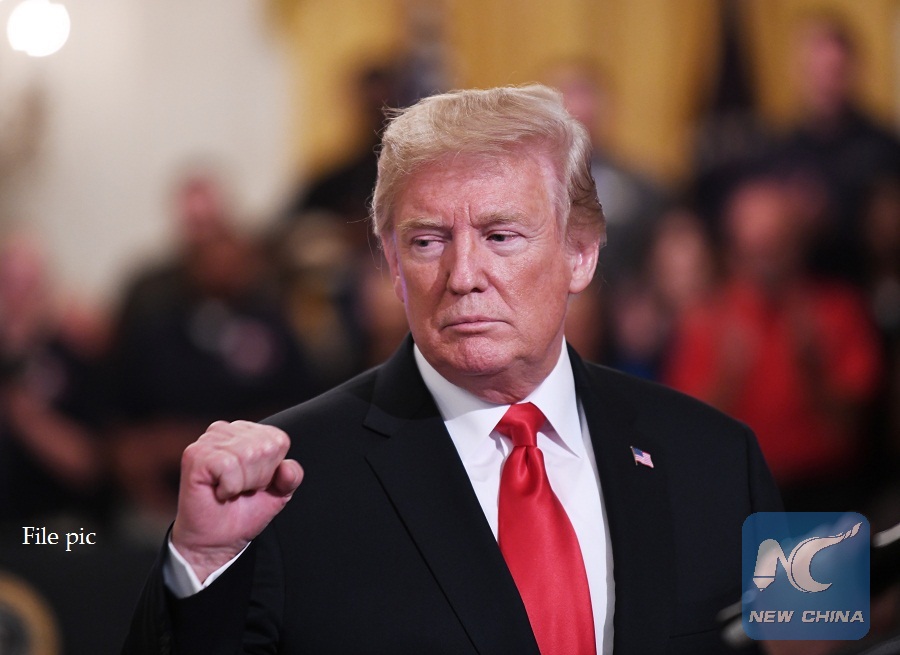
U.S. President Donald Trump makes a gesture during the Pledge to America's Workers event at the White House in Washington, D.C., the United States, on July 19, 2018. U.S. President Donald Trump hosted the Pledge to America's Workers event and signed an Executive Order that establishes a National Council for the American Worker. (Xinhua/Liu Jie)
by Nathan Morley
NICOSIA, July 29 (Xinhua) -- Observers remain cautious and skeptical after the European Union (EU) and the United States claim to have averted a trade war with an agreement to "work together towards zero tariffs."
The reasons are mainly related to the U.S. President Donald Trump administration's unpredictability, the rough relationship endured by Brussels and Washington lately, and most importantly the fact that nothing concrete has been agreed on.
On Wednesday, European Commission President Jean-Claude Juncker and Trump hailed a "new phase" in relations during their meeting at the White House.
For his part, Trump shelved a threat to slap tariffs on European cars; whilst in return, Juncker promised that the EU would buy more liquefied natural gas and soybeans from America.
But away from the back-slapping and smiles, caution and skepticism remain, as details of any firm agreement are glaringly short in supply.
"Of course you have to have the caveat that the devil will be in the details," European parliamentarian Richard Corbett told Xinhua. "It's an agreement to start a process and with Trump you can never be sure whether that will be followed up properly."
And given the Trump administration's unpredictable track-record, there are fears that any new talks could quickly unravel. Despite that, both Trump and Juncker vowed to address the steel and aluminum tariffs which kicked off the dispute earlier this year.
"It was started unilaterally by Trump without foundation really and using the security argument on products that really have nothing to do with security. Taking unilateral action like that is not the proper way of doing things," Corbett said, adding that Brussels and Washington had endured an uncomfortable relationship lately.
"I can understand people feeling uncomfortable when they are with Trump," Corbett added.
Experts and commentators on both sides of the Atlantic urged caution after the talks, as Juncker arrived in Washington without a specific trade offer, nor was one agreed.
"Some of the heat seems to have gone out of the situation for now, but unfortunately with this president what he says one week, might be contradicted by what he says the following week, so you can't really take anything for granted," Chris Horseman, a journalist specializing in agriculture and trade policy, told Xinhua.
"I don't think anything concrete has been achieved, as of today the same tariffs are in place throughout -- it's basically an agreement to talk, but it's fairly loosely formulated. It's really just a promise to talk rather than a commitment to ultimately do anything," Horseman added.
Over the last few weeks, Trump has faced increased domestic criticism as American agricultural goods such as soybeans, sugar and fruit become pricier in foreign markets due to retaliatory tariffs -- and thus less attractive to consumers.
"The truism is that nobody wins from a trade war," Horseman said.
"Certainly with the agricultural products, I think Trump has got himself into some problems domestically, with the knock-on effect of Chinese retaliatory tariffs on soybeans and some meat products, and this was starting to rebound on him," Horseman said.
"I think that is certainly why soybeans were specifically mentioned in the context of his press conference with Juncker," Horseman said.
Corbett said it is in the interests of all sides to avoid a spiral of retaliation, which would harm exporters and threaten jobs.
"It is, at first sight, a welcome development because we were facing, indeed the world is facing, the big risk of an escalating trade war with tit-for-tat measures and countermeasures leading to a downward spiral," Corbett added.

